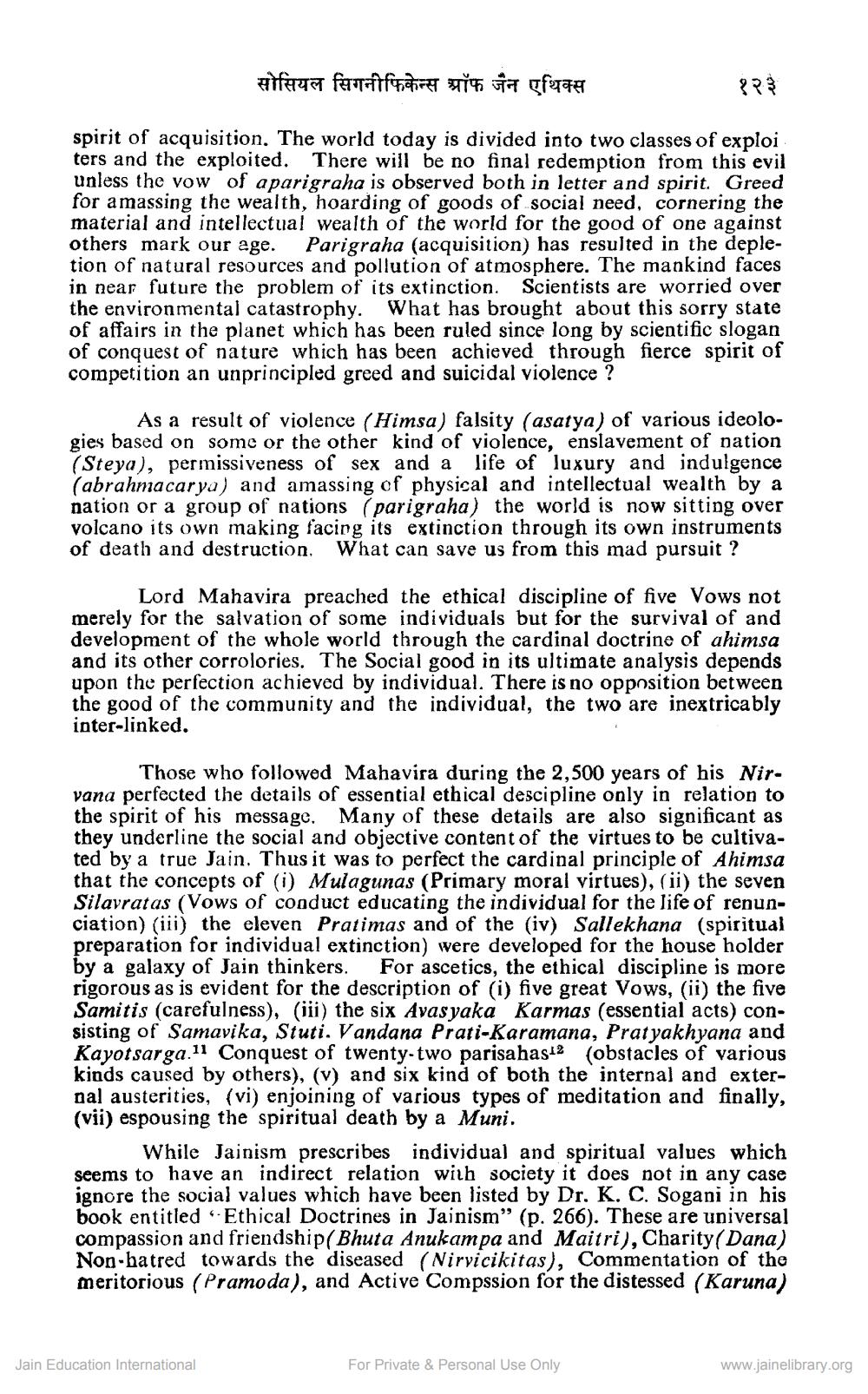________________
सोसियल सिगनीफिकेन्स ऑफ जैन एथिक्स
१२३
spirit of acquisition. The world today is divided into two classes of exploi ters and the exploited. There will be no final redemption from this evil unless the vow of aparigraha is observed both in letter and spirit. Greed for amassing the wealth, hoarding of goods of social need, cornering the material and intellectual wealth of the world for the good of one against others mark our age. Parigraha (acquisition) has resulted in the depletion of natural resources and pollution of atmosphere. The mankind faces in near future the problem of its extinction Scientists are worried over the environmental catastrophy. What has brought about this sorry state of affairs in the planet which has been ruled since long by scientific slogan of conquest of nature which has been achieved through fierce spirit of competition an unprincipled greed and suicidal violence ?
As a result of violence (Himsa) falsity (asatya) of various ideologies based on some or the other kind of violence, enslavement of nation (Steya), permissiveness of sex and a life of luxury and indulgence (abrahmacarya) and amassing of physical and intellectual wealth by a nation or a group of nations (parigraha) the world is now sitting over volcano its own making facing its extinction through its own instruments of death and destruction. What can save us from this mad pursuit ?
Lord Mahavira preached the ethical discipline of five Vows not merely for the salvation of some individuals but for the survival of and development of the whole world through the cardinal doctrine of ahimsa and its other corrolories. The Social good in its ultimate analysis depends upon the perfection achieved by individual. There is no opposition between the good of the community and the individual, the two are inextricably inter-linked.
Those who followed Mahavira during the 2,500 years of his Nirvana perfected the details of essential ethical descipline only in relation to the spirit of his message. Many of these details are also significant as they underline the social and objective content of the virtues to be cultivated by a true Jain. Thus it was to perfect the cardinal principle of Ahimsa that the concepts of (i) Mulagunas (Primary moral virtues), (ii) the seven Silavratas (Vows of conduct educating the individual for the life of renunciation) (iii) the eleven Pratimas and of the (iv) Sallekhana (spiritual preparation for individual extinction) were developed for the house holder by a galaxy of Jain thinkers. For ascetics, the ethical discipline is more rigorous as is evident for the description of (i) five great Vows, (ii) the five Samitis (carefulness), (iii) the six Avas yaka Karmas (essential acts) consisting of Samavika, Stuti. Vandana Prati-Karamana, Pratyakhyana and Kayotsarga.11 Conquest of twenty-two parisahası2 (obstacles of various kinds caused by others), (v) and six kind of both the internal and external austerities, (vi) enjoining of various types of meditation and finally, (vii) espousing the spiritual death by a Muni.
While Jainism prescribes individual and spiritual values which seems to have an indirect relation with society it does not in any case ignore the social values which have been listed by Dr. K. C. Sogani in his book entitled Ethical Doctrines in Jainism" (p. 266). These are universal compassion and friendship(Bhuta Anukampa and Maitri), Charity (Dana) Non-hatred towards the diseased (Nirvicikitas), Commentation of the meritorious (Pramoda), and Active Compssion for the distessed (Karuna)
Jain Education International
For Private & Personal Use Only
www.jainelibrary.org




